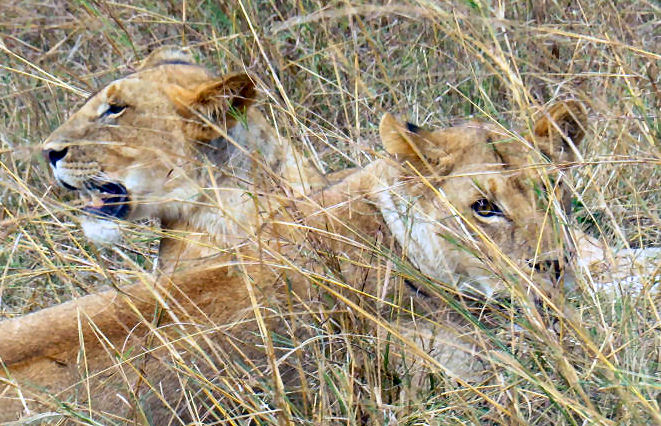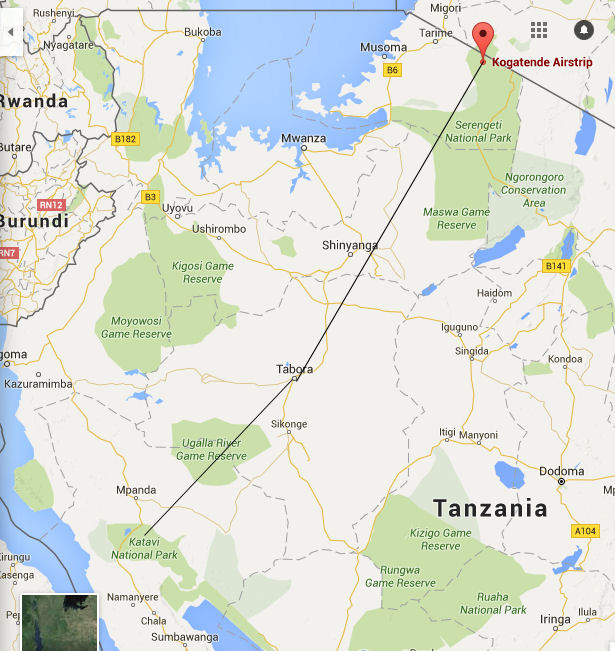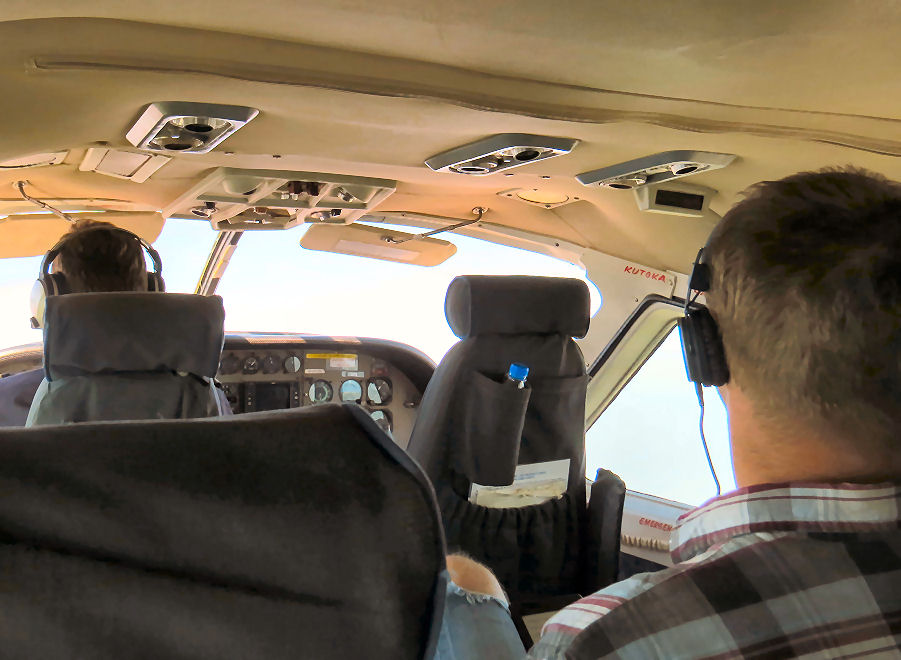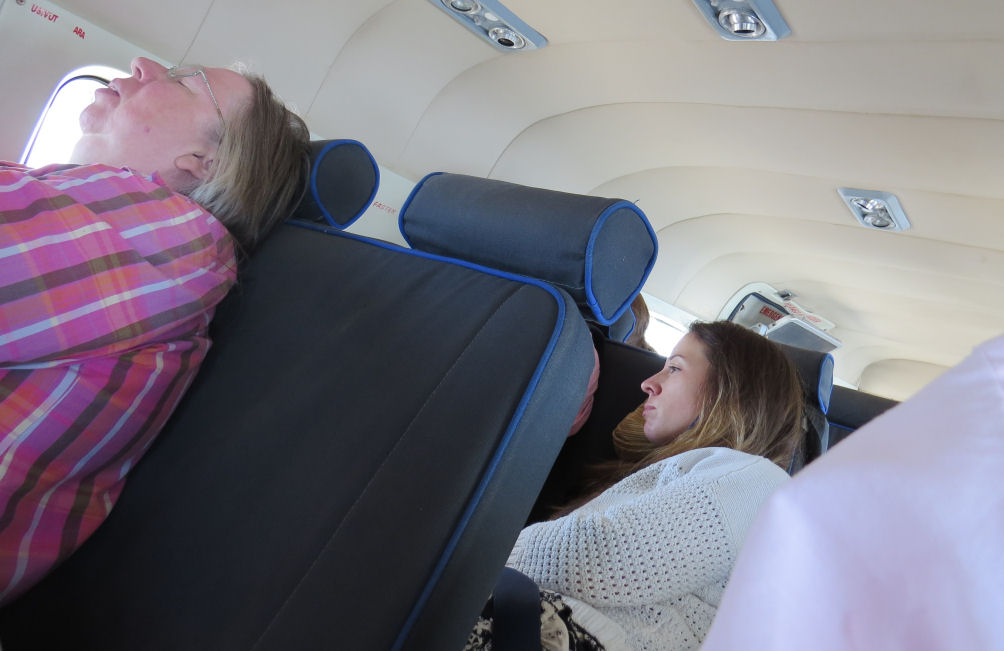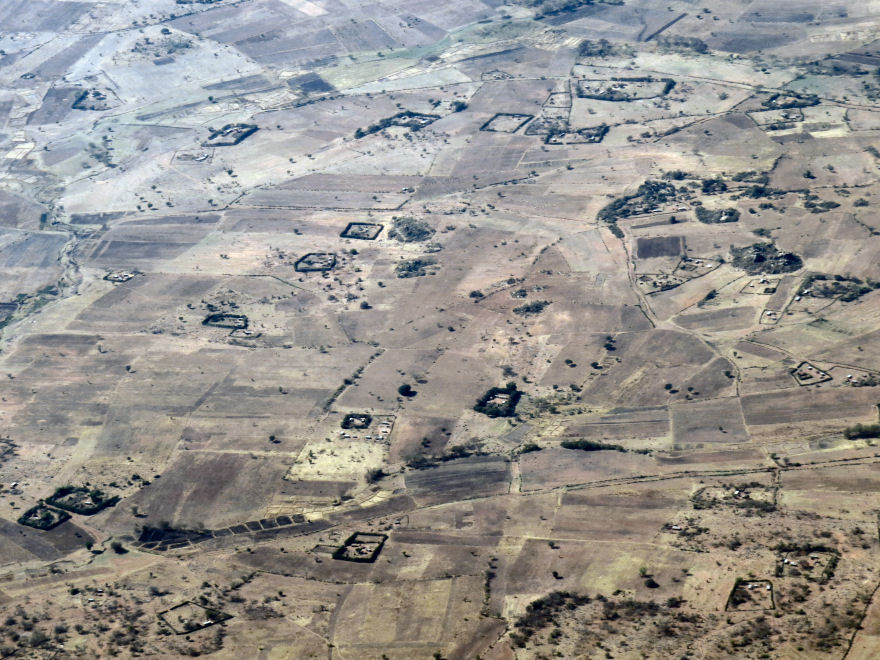The Serengeti was all that I expected and more. We were fortunate to be able to observe several crossings. I gained a much better understanding of the complexities of the Great Migration. We viewed an unbelievably wide variety of animals. In most cases they were sufficiently close to enable good observation angles and photos. I had been in enough zoos to know that most of them were not very active in the day. My only regret was that we missed the drama of the catastrophic crossing on Thursday.
Monday was really the only travel day on the trip's itinerary. The only activities scheduled in Serengeti were packing, breakfast, and a short drive to the airport.
I woke up at 6:00. I felt OK, but I did experience the same feeling of unease in the toilet room that I had on previous days. I wore my boots again, in case the pilot weighed the luggage.
Sue and I consumed our coffee and biscuits in the tent, we packed up, and, believe it or not, we were actually early for breakfast, the only breakfast that we ate in the Serian camp. I did not record any notes about the food, and my memory fails me. At breakfast we learned that Betty had been sick on the previous day and that Jeff had been sick three times during the night. I did not envy him. He did not like riding in the small planes even when he was healthy.
I put some money in the tip box and inscribed some innocuous comments in the guest book. I noticed that Chris had written a very long and effusive note there. She referred to Gerard as "Jarrod."
The staff loaded our luggage into one vehicle. We boarded our usual Land Cruiser, and Baraka drove us to the landing strip a little before eight. The plane was not there, and there was no activity for quite some time. I remembered that the itinerary had said "approx. 0800."
A plane finally came in low over the strip, but it did not land at first. It circled around and then touched down. Tom speculated that it was making sure that no animals were grazing on the landing strip.
This was not our plane. I felt like I needed to sit down, and the only seat there was on a bench by the old toilets. It was in the shade, and it was uncomfortable. It was still cool out, and even with my jacket I really wanted to be in the sun. I found this very annoying.
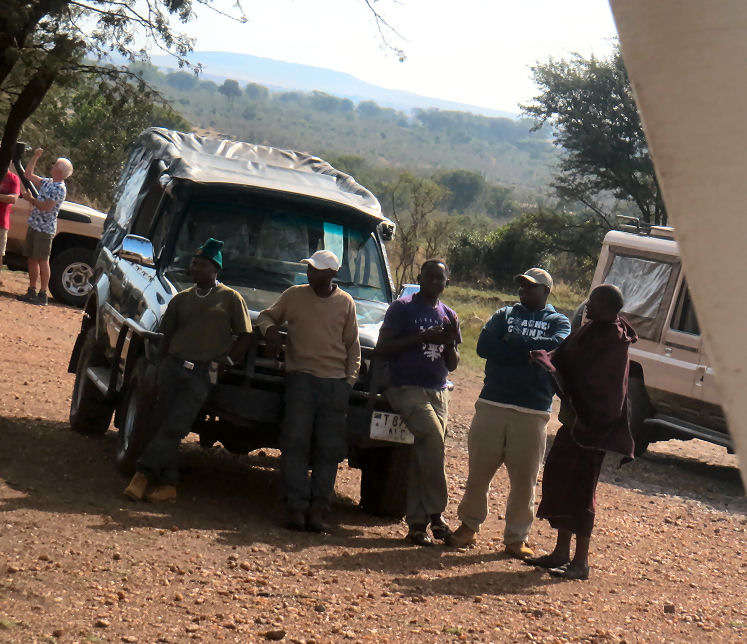
We waited for quite a while before our plane arrived. We said good-bye and thanks to everyone from the camp. The pilot did not weigh the luggage. We were the only people from Serengeti taking the flight to Katavi, but there were three passengers already aboard the plane. We came to know all three of them quite well. Matt and Hannah were honeymooners from London who would be with us for the rest of the trip, and Kate was the manager of the Greystoke Lodge in Mahale.
We boarded the plane. I sat in the sole window seat on the left in the second row. Sue sat in the double seat in the second row, behind Matt and Hannah.
As the plane took off, my only concern was whether I could get some impressive photos of the Serengeti before we got too high. I took some shots, but they were mediocre at best.
Soon we were over farmland. I could tell because the land looked like a checkerboard. I began to feel a little woozy, and so I closed my eyes. In my mind's eye, the checkerboard began to spin, and I knew that I was in serious trouble. I reached for the air sickness bag, and I needed it. Again and again I needed it.
I wish to make one fact perfectly clear. I never get any kind of motion sickness. I had been on hundreds of flights, large and small. Sue and I flew from Nantucket to Hyannis on a nine-passenger plane during a hurricane once. The winds were so strong that the ferries were grounded. I did not get sick. This flight, in contrast, was smooth from start to finish.
The worst was yet to come. I was holding the quite full airsickness bag in my lap. We were still at least thirty minutes from Tabora when the bag burst, spilling onto my lap, my backpack (but not my camera), the seat, and my boots. It was a gigantic mess.
I was very embarrassed, but as I was trying to do what I could to clean it up, I needed to reach for a second airsickness bag. This one burst, too, just before we landed in Tabora.
I apologized to the pilot, whose responsibities included cleaning up my mess. He said only, "It happens."
We all were required to disembark the plane. I was forced to walk through the terminal to the men's room in my filthy pants and boots. I cleaned them as best I could. I then walked back through the terminal in pants that were even wetter than before. I walked outside and sat on a curb in the sun to try to dry off my pants. As I sat there in the sun contemplating the upcoming flight to Katavi, I reached one of the most embarrassing and stressful points in my life. I felt very low. Believe it or not, however, even this was not the low point of the trip.
Evidently the others did not witness my performance on the airplane. They had expected Jeff to be sick, not me. Everyone was surprised to learn that the airsickness bags were not, in fact, water-tight. Tom found a plastic bag discarded in the bushes near the terminal. He offered it to me in case I had the same problem on the second leg of the flight. I put it in my pocket.
I did indeed need to reach for the air sickness bag during the takeoff and landing. I placed it in the plastic bag and disposed of them both at the airstrip in Katavi.
We said "So long" to Kate, who opined that our illnesses were attributable to "northern food." She said that they all suffered from it every time they went to the north.
We were met at the airstrip by staffers from Chada Camp and greeted enthusiastically by the camp's manager, a Belgian national named Julien Polet. They provided each of us with a Nomad water bottle.[1] It was, of course, too late for a morning game drive, but we did meet our guide, whose name was Molil or something like that. He brought us to the camp, which was similar in layout to the Serian camp in the Serengeti. I was very happy to make it to the camp without getting sick again. A few times I felt pretty woozy. By the time that we reached camp it was time for lunch, but I had no interest in eating. I lay down on the bed in tent #1 as monkeys scampered back and forth across the canvas roof. Sue found some Alka-Seltzer in her duffel, and I took it.
While Sue was at lunch, a giraffe was clearly visible through the tent's netting perhaps twenty yards away. I did not have enough energy to retrieve my camera from its case and take a photo of it. If it had been a unicorn or a sasquatch, I might have tried, but I already had plenty of pictures of giraffes.
Sue came back from lunch. She felt my forehead and said that I was "burning up." I did not feel sick; I just felt weak.
I skipped the afternoon game drive, and I also skipped supper. The cooks fixed me a plate of pasta with a little olive oil and nothing else. Someone brought it to me in the tent. By that time I was feeling a little better. I got up and ate it sitting at the desk. In fact, it tasted quite good.
When Sue got back, she affirmed that my fever seemed to be gone or at least markedly abated. I was still very tired. I unpacked a little and got back into bed. I forgot to take my Malarone. From this point on my health improved every day. By the time that we reached Mahale, I felt fine.
[1] Nomad ran both the Chada Camp in Katavi and Greystoke Lodge in Mahale. The company's policy was to provide fewer but larger water bottles for guests. Instead of taking individual bottles, one was expected to carry the Nomad bottle and refill it from the large plastic bottles when necessary.
